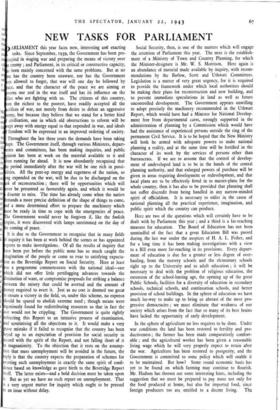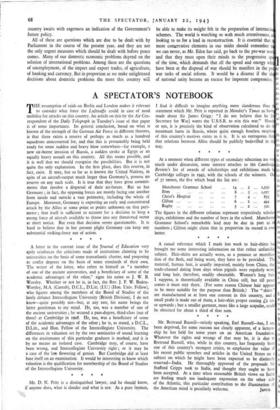NEW TASKS FOR PARLIAMENT
Throughout the last three years the demands have been taking ape. The Government itself, through various Ministers, depart- ents and committees, has been making inquiries, and public pinion has been at work on the material available to it and ften running far ahead. It is now abundantly recognised that e period immediately after the war will be one rich in possi- Aides. All the pent-up energy and eagerness of the nation, so ng expended on the war, will be due to be discharged on the sk of reconstruction ; there will be opportunities which will ever be presented so favourably again, and which it would be disaster to miss. The time has already come when the nation emands a more precise definition of the shape of things to come, nd a more determined effort to prepare the machinery which ust be ready in time to cope with the emergencies of peace. 50. he Government would never be forgiven if, like the foolish Id irgins, it were discovered with lamps untrimmed on the day of 43 e coming of peace.
It is due to the Government to recognise that in many fields d. f inquiry it has been at work behind the scenes or has appointed xperts to make investigations. Of all the results of inquiry that ave been put before the public none has so much caught the magination of the people or come so rear to satisfying expecta- on as the Beveridge Report on Social Security. Here at least vas a programme commensurate with the national ideal—one hich did not offer little pettifogging advances towards the minution of want, or compromise proposals for striking a balance tween the misery that could be averted and the amount of oney required to avert it. Just as no cost is deemed too great o ensure a victory in the field, so, under this scheme, no expense hould be spared to abolish extreme need ; though means were geniously found for redistributing resources so that in fact the ost would not be crippling. The Government is quite rightly ubjecting this Report to an intensive process of examination, nd scrutinising all the objections to it. It would make a very ave mistake if it failed to recognise that the country has been eyed up to an expectation of provision for social security in ccord with the spirit of the Report, and not falling short of it n magnanimity. To the objection that it rests on the assump- ion that mass unemployment will be avoided in the future, the eply is that the country expects the preparation of schemes for veiling such unemployment in exactly the same spirit of confi- ence based on knowledge as gave birth to the Beveridge Report tself. The latter exists—and a bold decision must be taken upon it. But as yet we have no such report on unemployment. That is a very urgent matter for inquiry which ought to be pressed to an issue without delay. Social Security, then, is one of the matters which will engage the attention of Parliament this year. The next is the establish- ment of a Ministry of Town and Country Planning, for which the Minister-designate is Mr. W. S. Morrison. Here again is an abundance of material made available by inquiry, with recom- mendations by the Barlow, Scott and Uthwatt Committees. Legislation is a matter of very great urgency, for it is required to provide the framework under which local authorities should be making their plans for reconstruction and new building, and to prevent immediate speculations in land as well as future uncontrolled development. The Government appears unwilling to adopt precisely the machinery recommended in the Uthwatt Report, which would have had a Minister for National Develop- ment free from departmental cares, strongly supported in the administration of planning by a Commission which would have had the assistance of experienced persons outside the ring of the permanent Civil Service. It is to be hoped that the New Ministry will both be armed with adequate powers to make national planning a reality, and at the same time will be fortified in the character of its work by the services of persons other than bureaucrats. If we are to assume that the control of develop- ment of undeveloped land is to be in the hands of the central planning authority, and that enlarged powers of purchase will be given in areas requiring development or redevelopment, and that local plans are to be effectively fitted in to master-plans for the whole country, then it has also to be provided that planning shall not suffer discredit from being handled in any narrow-minded spirit of officialdom. It is necessary to enlist in the cause of national planning all the practical experience, imagination, and public spirit which the country can produce.
Hera are two of the questions which will certainly have to be dealt with by Parliament this year ; and a third is a far-reaching measure for education. The Board of Education has not been unmindful of the fact that a great Education Bill was passed during the last war under the auspices of H. A. L. Fisher, and for a long time it has been making investigations with a view to a Bill even more far-reaching in its provisions. Every depart- ment of education is due for a greater or less degree of over- hauling, from the nursery schools and the elementary schools right up to the University and to adult education ; it will be necessary to deal with the problem of religious education, the extension of the school-leaving age, the opening up of the great Public Schools, facilities for a diversity of education in secondary schools, technical schools, and continuation schools, and better provision of school buildings. In the sphere of education we have much lee-way to make up to bring us abreast of the most pro- gressive democracies ; we must eliminate that weakness of our society which arises from the fact that so many of its best brains have lacked the opportunity of early development.
In the sphere of agriculture no less requires to be done. Under war conditions the land has been restored to fertility and pro- ductiveness ; the farmer has been made comparatively comfort- able ; and the agricultural worker has been given a reasonable living wage which he will very properly expect to retain after the war. Agriculture has been restored to prosperity, and the Government is committed to some policy which will enable it to be maintained. But how? Some round economic basis has yet to be found on which farming may continue to flourish. Mr. Hudson has thrown out some interesting hints, including the suggestion that we must be prepared to pay more not only for the food produced at home, but also for imported food, since foreign producers too are entitled to a decent living. The country awaits with eagerness an indication of the Government's future policy.
All of these are questions which are due to be dealt with by Parliament in the course of the present year, and they are not the only urgent measures which should be dealt with before peace comes. Many of our domestic economic problems depend on the solution of international problems. Among these are the questions of unemployment, of the import and export trades, of agriculture, of banking and currency. But in proportion as we make enlightened decisions about domestic problems the more this country will be able to make its weight felt in the preparation of internatio schemes. The world is watching us with much attentiveness, looking to us for a lead in reconstruction. It is essential that more cons,ervative elements in out midst should remember we can never, as Mr. Eden has said, go back to the pre-war wort and that they must open their minds to the progressive sp of the time, which demands that all the speed and energy whi have been at the disposal of war should be manifest in the po war tasks of social reform. It would be a disaster if the id of national unity became an excuse for impotent compromise.



























 Previous page
Previous page